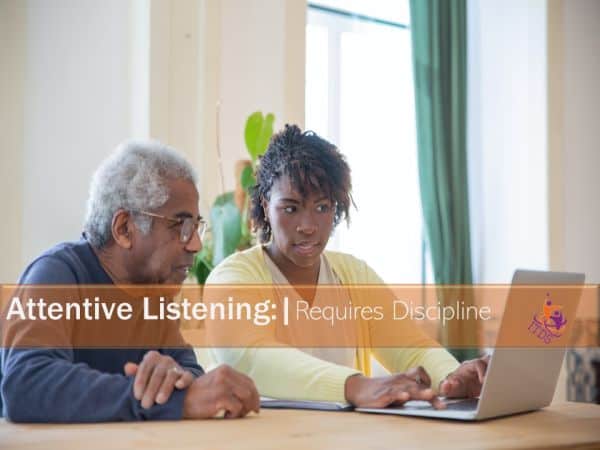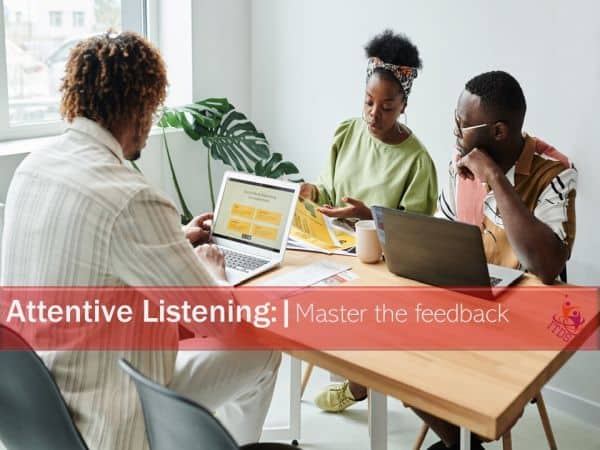
Last updated on October 22nd, 2025 at 12:22 pm
How To Use Attentive Listening To Actually Skyrocket Sales
- Home
- How To Use Attentive Listening To Actually Skyrocket Sales

Recently, at a monthly mastermind group meeting, a member asked me, “Lorna, what does it take to really, really skyrocket sales?”
I let the suspense hang in the air for a couple of seconds…with all eyes focused on me.
Then I replied matter-of-factedly: “attentive listening.”
I could feel the “ahhmm…that’s the best you can do, bright girl?” circle around the room.
Let me jump straight to the part I know you want to hear.
30 minutes later, they were decidedly clear why attentive listening was necessary to increase sales. That’s because I had shared some key tips which they could implement at once and they couldn’t wait to begin.
Now it’s your turn to be just as enlightened as they are.
What is attentive listening?
It is a crucial skill that plays a significant role in effective communication and building strong relationships.
It involves focusing your full attention on the speaker and making a conscious effort to understand their message, both the words they use and their underlying meaning.
By listening attentively to your customers, you can gain valuable insights and build stronger relationships.
This in turn can lead to increased customer satisfaction, which leads to greater trust and of course increase sales.
Why you must use attentive listening to skyrocket sales
There are many reasons why you should practice and use attentive listening to skyrocket your sales.
Here are 6 of them:
1. Enhanced Understanding: You are better able to grasp the information your customer or client is sharing. It means you understand their perspective, thoughts and emotions, which increases the chances of providing meaningful solutions.
2. Improved Communication: When you listen attentively, you are better able to respond appropriately and contribute meaningfully to the conversation. It ensures that your responses are relevant and accurate, promoting effective dialogue and reducing misunderstandings.
3. Builds Trust and Rapport: By giving someone your undivided attention, you show respect and value for their input. These foster trust in business and strengthen relationships.
4. Solves Problems: Attentive listening is essential in problem-solving situations. When you fully understand the concerns, needs, and perspectives of others, you can identify common ground, find creative solutions, and reach mutually beneficial outcomes.
5. Resolves Conflict: In conflicts or disagreements, attentive listening is key to finding common understanding and managing that conflict. Listening attentively helps you to identify underlying concerns and work towards finding a resolution that satisfies everyone involved.
6. Promotes Personal and Professional Development: When you actively listen, you open yourself up to new ideas, perspectives, and knowledge. It allows you to expand your horizons, challenge your assumptions, and gain valuable insights from others.
How to listen attentively
I guess I could tell you that attentive listening is as simple as deciding to give your full attention to someone who is talking to you.
But there is more to it than that.
For me, it consists of 2 parts: Discipline and Feedback. And you have to master both.
The discipline of attentive listening

Here are 6 ways to be disciplined when you decide to give a client or customer your full attention.
1. Don’t interrupt when the client is describing the problem
No matter how much you want to, don’t interrupt. Not even to establish common ground or connect with your client.
So comments like “Oh, I know how you feel” Or “I have a lot of clients who have gone through the same thing” are not appropriate at this time.
Of course, establishing common ground is useful in building strong client relationships. But this is more effective later in the process.
Problem is, if you are not disciplined enough to exercise restraint, there may not be a later.
2. Don’t lose your focus when you set out to listen
For example, don’t start rehearsing what you’re going to say as soon as your client finishes sharing their information.
Even if you’re a Master Multi-tasker, who can walk, chew gum and turn cartwheels at the same time, don’t.
Listening and thinking about what you’re going to say next doesn’t work as well as you think. You’re sure to miss something. Even a lot of important “somethings”.
And while you’re at it, turn off those distractions like your cell phone. Hold all calls and stop planning your next meeting in your head.
Stay focused on the present. Stay focused on your client.
3. Don’t interrupt the client to share your opinion
Or to disagree with them or challenge their thinking.
Yes, you’re strongly opposed to their position on an issue. You have the facts that prove their information is wrong. You also have strong convictions about what they are discussing.
Do you interrupt to share any of this? No. Instead, have the discipline to listen attentively.
Support your listening by taking notes and letting the client or customer know you’re listening.
The last thing you want is for the interaction to descend into an argument at this time. Your time will come to share your side.
4. Don’t choose what you hear
We’re only human. And as such, we tend to hear what interests us or what sits with our values.
But when you’re listening to a customer, and if you want to get them to dig deeper into their pockets, you can’t choose what you hear.
You have to take it all in like a factual and emotional sponge – facts, feelings, emotions, ideas.
You’ll have the opportunity later to wring out the relevant information, but until then, take nothing for granted.
5. Don’t go into “solution mode” too quickly
I used to be like that when I first started out as a consultant.
I was always listening for that moment when the potential client would mention a problem that I could fix. Then I would rush in with a solution before the person could get any further.
How immature I was!
As I mature in my role, I come to realise that by listening attentively, I was able to grasp the entire picture and offer a much more comprehensive solution.
So exercise patience and develop the discipline to listen to your client or customer with full attention.
6. Don’t jump in too soon after a client is finished speaking
In public speaking, you learn about the impact of the pause. But its impact on effective listening is seldom highlighted.
Most people jump in too soon after the other person has finished speaking. As a matter of fact, they often jump in before they are finished.
When you’re using attentive listening to explode your sales, jumping in too soon sends the message that you really weren’t listening that well after all.
This can create tensions and mix-ups and undermine any rapport you could have built.
So please…when someone sounds like they are about to finish what they are saying, pause for a few seconds, before you start talking.
Master Feedback – the other half of attentive listening

When you can exercise discipline as you give a client your full attention, you’re halfway home to becoming a great listener.
However, to hit it to the boundary for a six, you have to master another challenge: Feedback.
You dare to ask why?
Well, positive, genuine, attuned feedback—at the right time after your clients have fully expressed themselves—promotes discovery and builds trust.
On the other hand, negative or half-hearted feedback hurts the quality of client relationships. Or worse, it prevents you from being strong and assertive in every situation.
So how is your feedback? Is it unresponsive? superficial? workmanlike? or attuned?
Here are 4 types of feedback to help you decide your feedback style.
1. Unresponsive feedback
This consists of mainly content-free, meaningless, and frequently repeated utterances such as “I see,” “Sure,” “Really,” “Terrific,” and “That’s great!”
I bet you notice that this type of feedback lacks any meaningful recall and or acknowledgment of anything your client has said.
2. Superficial feedback
When you try to acknowledge what the client said, without specific reference to what was actually said, that’s superficial feedback.
For example: “That’s interesting” or “I know what you mean.”
To make matters worse, it’s often delivered in a manner that lacks sincerity and empathy.
Nothing about superficial feedback lets the client or customer know that you have listened attentively. It doesn’t let them know that you understood what they have said and are now ready to take meaningful action.
3. Workmanlike feedback
This is a good sign of attentive listening. You are able to almost quote facts, feelings and opinions, which the clients shared with you.
But hold on…
Workmanlike feedback fails to effectively summarise what you heard. When you summarise, you explain what you’ve heard, in your own words, in an organized and logical manner.
Smart clients will recognize that you’re just giving them back their own words and quickly tune out in frustration.
4. Attuned feedback
This is the degree of feedback you’re aiming for almost 100% of the time.
This is the degree of feedback that comes when you’re disciplined in your attentive listening.
It is entirely client-focused. It’s completely responsive to the client’s thoughts and emotions, with little room for any ego-driven input.
When you deliver this type of feedback, pausing before you do, really matters. It makes the client think that you have thought about what you’re going to say and you’re choosing your words carefully.
Therefore, don’t spoil your “carefully chosen words” by surrounding them with awkward and cliched words and expressions.
For example: “So if I heard you correctly,” “Let me see if I got this right,” “What I think you’re saying” are all to be avoided.
When you provide attuned feedback, your clients will realize that you’re different from all the other professionals they’ve dealt with.
They’ll realize you made the interaction about them—as it should be and they will reward you with their business!
Your next “attentive listening” steps
Listen, your next steps are very simple for sales-driven attentive listening.
1.. Decide you really, really want to skyrocket your sales.
2. You’ve read the post. But study it in detail now, so you understand at a deeper level, how great listening can help you skyrocket your sales.
3. Decide where your sales-driven listening skills are weakest and start there.
It’s that simple…really.



